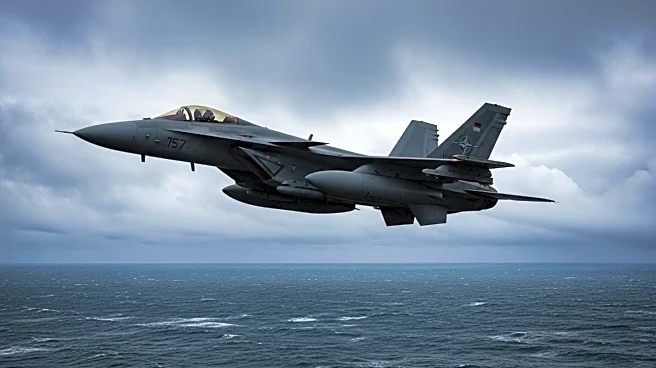What's Happening?
On September 19, 2025, three Russian MiG-31 jets entered Estonian airspace, which is part of NATO territory, over Vaindloo island. The incursion lasted 12 minutes, prompting a response from Italian, Swedish, and Finnish fighter jets. This incident is part of a series of airspace violations by Russia, with eight occurrences since the invasion of Ukraine in February 2022. In response, NATO has launched the 'Eastern Sentry' operation to bolster defenses on its eastern flank, deploying more jets and air defense resources. Italy has extended its deployment of a SAMP/T air defense system in Estonia until spring 2026. NATO nations are updating their rules of engagement to streamline the process of identifying and shooting down incurring drones.
Why It's Important?
The repeated airspace violations by Russia in the Baltic Sea region have heightened tensions between NATO and Russia. These actions are seen as attempts by Russia to divert attention from Ukraine and force NATO countries to focus on their own territorial defense. The situation underscores the strategic importance of the Baltic Sea as a key air and sea bridge for Russian military and commercial activities. NATO's response, including enhanced defense measures and potential changes in rules of engagement, reflects the alliance's commitment to defending its territories and supporting Ukraine. The developments could impact regional security dynamics and influence NATO's future military strategies.
What's Next?
NATO's 'Eastern Sentry' operation will continue to deploy additional air defense resources in the region. Discussions are ongoing about extending NATO's air defense shield into western Ukraine to protect territory and prevent Russian munitions from reaching allied borders. The possibility of shooting down manned Russian aircraft violating allied airspace is also under debate. European nations are increasing surveillance and conducting inspections of suspected Russian-linked vessels in the Baltic Sea. The emergence of unidentified drones over northern Europe adds a new layer of complexity to the security situation, with European leaders linking their appearance to Moscow.
Beyond the Headlines
The Baltic Sea's strategic importance as a conduit for Russian energy exports and military operations makes it a potential flashpoint in future conflicts. The region handles significant global shipping traffic, and NATO's near-total control of the coastline limits Russian opportunities. However, acts of alleged undersea sabotage and the presence of a 'shadow fleet' of tankers evading sanctions highlight ongoing security challenges. The situation raises questions about international maritime law and the balance between peacetime operations and military readiness.









